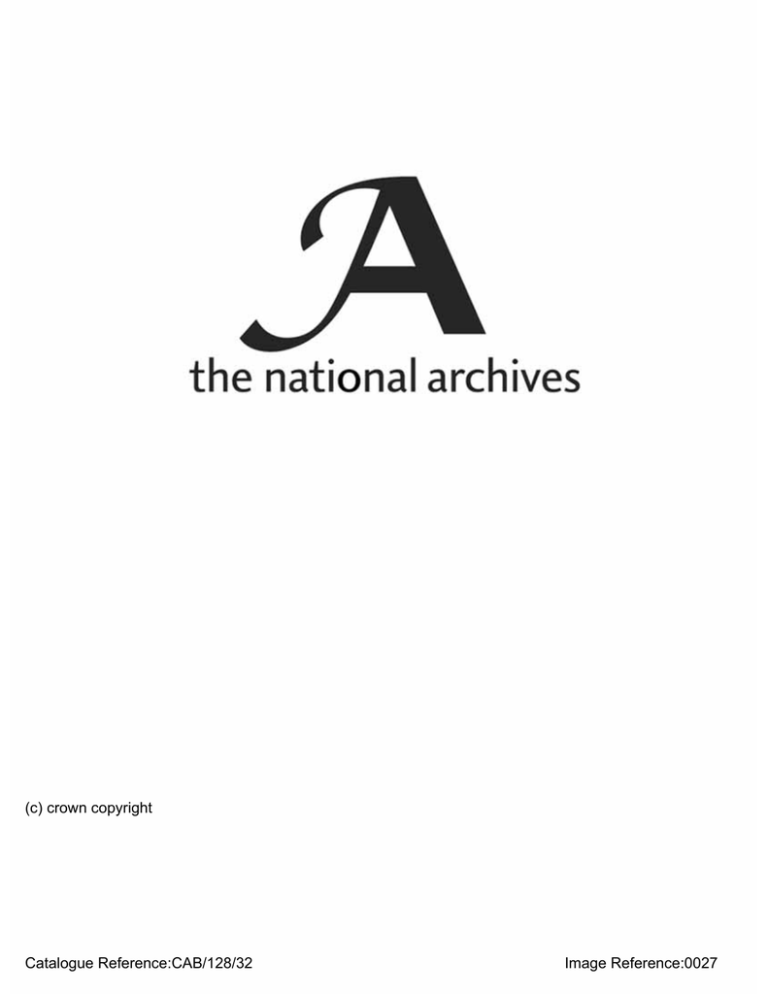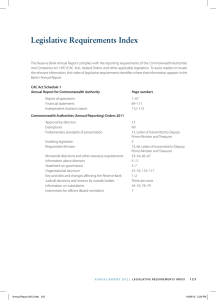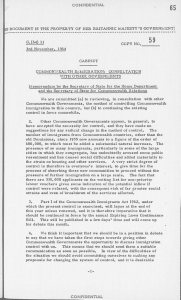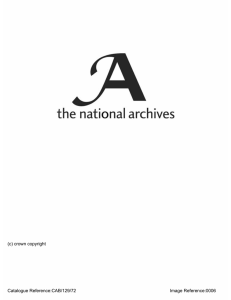(c) crown copyright Catalogue Reference:CAB/128/32 Image Reference:0027
advertisement

(c) crown copyright Catalogue Reference:CAB/128/32 Image Reference:0027 V T H I S D O C U R I E N T IS T H E P R O P E R T Y O F HER BRITANNIC M A J E S T Y S Printed for the Cabinet. G O V ERNMENT March 1958 C.C. (58) Copy N o . 27th Conclusions CABINET CONCLUSIONS of a Meeting of the Cabinet held in the Prime Ministers Room, House of Commons, S.W. 1, on Thursday, 27th March, 1958 at 4-45 p.m. Present: Tire Right Hon. H A R O L D M A C M I L L A N , M .P., Prime Minister (For Items 1 and 2) The Right Hon. V I S C O U N T K I L M U I R , The Right Hon. D . H E A T H C O A T - A M O R Y , M.P., Chancellor of the Exchequer. Lord Chancellor. The Right Hon. The E A R L O F H O M E , The Right Hon. A L A N L E N N O X - B O Y D , M . P . , Secretary of State for the Secretary of State for Commonwealth Colonies. Relations (In the Chair for Item 3). The Right Hon. V I S C O U N T H A I L S H A M , The Right Hon. J O H N M A C L A Y , M . P . , Q.C., Lord President of the Council. Secretary of State for Scotland. The Right Hon. I A I N M A C L E O D , M.P., The Right Hon. Sir D A V I D E C C L E S , M.P., Minister of Labour and National President of the Board of Trade. Service. The Right Hon. H E N R Y B R O O K E , M.P., The Right Hon. L O R D M I L L S , Minister of Minister of Housing and Local GovPower. ernment and Minister for Welsh Affairs. The Right Hon. H A R O L D W A T K I N S O N , The Right Hon. J O H N H A R E , M.P., M.P., Minister of Transport and Civil Minister of Agriculture, Fisheries and Aviation. Food. Dr. The Right Hon. C H A R L E S H I L L , The Right Hon. R E G I N A L D M A U D L I N G , M.P., Chancellor of the Duchy of M.P., Paymaster-General. Lancaster. The following were also present: The Right Hon. D . O R M S B Y - G O R E , M.P. Minister of State for Foreign Affairs. The Right Hon. E D W A R D H E A T H , M.P., Parliamentary Secretary, Treasury. Secretariat : The Right Hon. Sir N O R M A N Mr. B . S T . J. Mr. M. TREND. REED. BROOK. CONTENTS Minute No. 1. 2. 3. Subject Rent Restriction Meeting of Heads of Governments Commercial Policy F r e e Trade A r e a . Rent Restriction. (Previous Reference: C.C. (58) 26th Conclusions, Minute 2.) * 1 . The Cabinet resumed their discussion of the proposals of the Minister of Housing (C. (58) 64) for the mitigation of hardship arising under the Rent Act, 1957. In this discussion it was assumed that a Bill could be drafted which would relieve cases of genuine hardship without undermining the principles and operation of the main Act. On that assumption the following points were m a d e : — (a) Consideration had been given to various forms of administrative action as alternatives to legislation, e.g., encourage­ ment of local authorities to buy houses from which the landlord intended to evict the tenant in order to sell; enabling local authorities to borrow money for this purpose at specially low rates; and empowering local authorities to make loans to tenants wishing to buy their houses, u p to the full amount of the purchase price. None of these expedients seemed, however, to be feasible. (b) If legislation on the lines proposed were not enacted, large­ scale evictions in the last months of the year were inescapable. The Government would then have to choose between two alternatives— legislation at short notice and under heavy pressure or the stigma of an inhuman refusal to relieve hardship. Neither of these could be regarded as tolerable. (c) Further consideration should be given to the possibility of restricting the scope of the proposed Bill by: — (i) specifying as precisely as possible the classes of tenant in whose favour the courts would be empowered to grant a stay of eviction; (ii) modifying the present proposal on the level of rent payable during the period of stay; (iii) delimiting more precisely the period of stay which the courts would be empowered to grant. (d) Further consideration should also be given to the presentation of the problem and its solution to the Governments supporters. Summing up the discussion The Prime Minister said that the balance of the discussion appeared to suggest that in principle the Government should legislate on the lines proposed, by the Minister of Housing. But, before a final decision was taken, further thought should be given to the details—in particular, the extent to which the scope of the Bill could be restricted. Careful thought would also be required on the presentation- of the proposals, both to Government supporters and to the general public. If the Government were to proceed with legislation on these lines, it seemed on balance to be preferable that an announcement should be made before Easter rather than later in the year. The Cabinet— Invited the Minister of Housing to submit to them, at a meeting early in the following week, proposals for the mitigation of hardship arising under the Rent Act, 1957, revised in accordance with the points raised in their discussion, together with a draft of an announcement of the Governments intentions. * Previously recorded in a M o s t Confidential R e c o r d . M e e t i n g of H e a d s of Governments, (Previous Reference: C . C . (58) 2 6 t h Conclusions, M i n u t e 5.) 2. The Cabinet were informed that the North Atlantic Council had now endorsed, subject to some minor amendments, the proposed statement on the attitude of the Western Powers towards a meeting of Heads of Governments. The draft had been referred to Governments for final approval, and it was hoped that it could be communicated to the Soviet Government (by the Governments of the United States, the United Kingdom and France) and published before Easter. Meanwhile there was reason to believe that the Soviet Government would shortly announce a unilateral suspension of nuclear tests. If Ministers were pressed for an early statement on their attitude to such an announcement, it would be necessary to give a temporising reply. Commercial Policy. 3. The Cabinet had before them memoranda by the Paymaster-General (C. (58) 65 and 67) about the course of the Free Trade negotiations for the establishment of a Free Trade Area. '. The Paymaster-General said that the attitude of the French (Previous Government remained one of the greatest obstacles to progress. They Reference: j p d u c e d alternative proposals which, if approved by the Six C.C. (58) 14th p j April, would be formally put forward for discussion by the Conclusions, Committee which was co-ordinating the negotiations on the Free M i n u t e 6.) Trade Area. These proposals would probably be designed to enable the Six Powers to share the preferences which we ourselves enjoyed in Commonwealth markets. Hitherto we had countered suggestions of this kind by emphasising that the Commonwealth constituted a balanced system of duties as well as rights which did not benefit the United Kingdom alone. But we must recognise that the French proposals might have attractions for some members of the Commonwealth, particularly Australia and New Zealand, who were increasingly concerned at the prospect of losing their Continental markets as a result of the Treaty of Rome and might be tempted to seek to secure an enlargement of those markets by reaching agreement with the Six Powers on preference margins at our expense. Although we had repeatedly emphasised to the Six Powers that, if they sought to compel us to choose between Europe and the Commonwealth, they would destroy all hope of establishing the closer relations between the United Kingdom and Europe embodied in the concept of the Free Trade Area, we must nevertheless remain on our guard against the risk of being gradually subjected to a combination of pressure from the Six and from certain members of the Commonwealth. A r e a n a ( ro o w e r s n In discussion it was emphasised that the extension of the area of discriminatory preferences which appeared to be the French objective would be contrary to the principles of the General Agreement on Tariffs and Trade. It would also constitute a concession which no other member of the Commonwealth should feel able to make without our consent. We should, therefore, take steps to ensure that the other members of the Commonwealth realised that a modification of the preferences which they granted to the United Kingdom was not a concession which they could make unilaterally. It might also become necessary to consider whether we should warn them that we might be compelled to reconsider both the system of duty-free entry of Commonwealth goods into this country and the scale on which we could afford to invest in Commonwealth territories. On the other hand, it was unlikely that the Six Powers would ever be able to offer a market for Commonwealth products comparable with that which they commanded in this country; and there were some indications that the other members of the Commonwealth, although interested in the French proposals, were adopting a cautious attitude towards them. F o r these reasons it would perhaps be premature to reject the French proposals publicly at this stage and thus to jeopardise the possibility of achieving the Free Trade Area. We could not prevent the Six Powers and the other members of the Commonwealth from conducting discussions between themselves; and for the time being we should be content to keep developments under close review. But we should seek to prevent the French Government from achieving a negotiating position in which they could divide the United Kingdom from the rest of the Commonwealth by persuading certain Commonwealth members to seek our consent to a reduction of our preferences in Commonwealth markets as the price of securing the establishment of the Free Trade Area; and we should avoid allowing ourselves to be manoeuvred into a position in which we might forfeit both our preferences in Commonwealth markets and the possibility of creating the Free Trade Area. It might be necessary to reach a decision on these issues at very short notice in the near future. It might also be advisable to consider the policy which we should adopt if it seemed likely that the Free Trade Area project would fail. The C a b i n e t ­ (1) Took note of C. (58) 65 and 67. (2) Invited the Paymaster-General to be guided, in the forthcoming negotiations on the establishment of a European Free Trade Area, by the considerations which had emerged in their discussion. (3) Invited the Paymaster-General to circulate a further report on the progress of those negotiations in the near future. Cabinet Office, S. W.1, 28th March, 1958.




